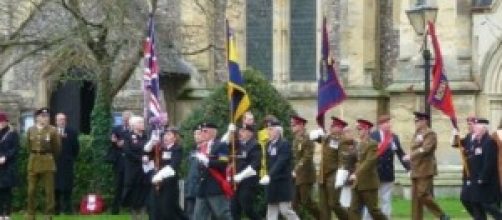As Remembrance Day has come and gone for another year, it has no doubt raised different emotions for different people. From those directly affected (whether that be involved in the Armed Forces themselves or having friends or family who are / have been), to those who are touched by the sentiment of the commemoration and want to pay their respects in some manner (maybe feeling that a few pennies in a rattling tin suffices) and even those who have no interest at all (perhaps because they are anti war in all its forms or are simply apathetic). Few would surely doubt that it would be basically wrong to simply forget about the sacrifice of so many lives on all sides during conflicts though, yet the debate and discussion will surely rage on as to what is a fitting tribute and how much publicity should it attract?
The buying of red poppies is a tradition that has become symbolic of people's support for Remembrance Day, being as it harks back to the Western Front battlefields of World War I, where red poppies grew in marked contrast to the muddy landscape of the trenches nearby. They are also mentioned in the poem "In Flanders Fields" which seems to have prompted the initial making of handmade poppies by an American professor, prior to becoming popularised in England. The gathering of many people at Ypres this year was in homage to the many deaths in that area during the 'Great War'.
Similarly, a minute or two of silence for reflection or a silent prayer on the 11th hour of the 11th month has become synonymous as a way of demonstrating at least some respect and regard to the occasion, which still seems to be observed by many up and down the country either in their workplaces or in their homes.
The laying of wreaths on Remembrance Sunday at the Cenotaph in London by the Queen, Royal Family and other leading British (and elsewhere) dignitaries seems to be another fitting gesture to honour those who lost their lives for their country and its people.
Similar ceremonies to those in London on a far smaller scale are carried out elsewhere in the country, although one sometimes wonders if the younger generation understand what the purpose and meaning behind such occasions is. There was the shocking and disturbing news of an army veteran in Keighley who was attempting to pay his own respects last Sunday to fallen comrades, when he was attacked by a local gang who stole his service medals.
This may not be atypical of the society in which we live, but the timing made the incident even more striking.
A new concept that was introduced this year were the mass of ceramic poppies temporarily covering the Tower of London's moat, to commemorate the centenary of the start of the First World War, entitled "Blood Swept Lands And Seas Of Red". Visual displays such as this are striking and generate conversations in all ages, which is essentially a good thing to ensure that the old adage "lest we forget" is observed. The fact that around four million people are believed to have visited the site and observed the display, in some way demonstrates at least a general interest in the message attempting to be conveyed.

